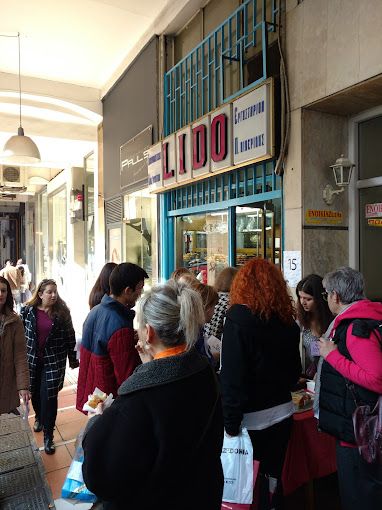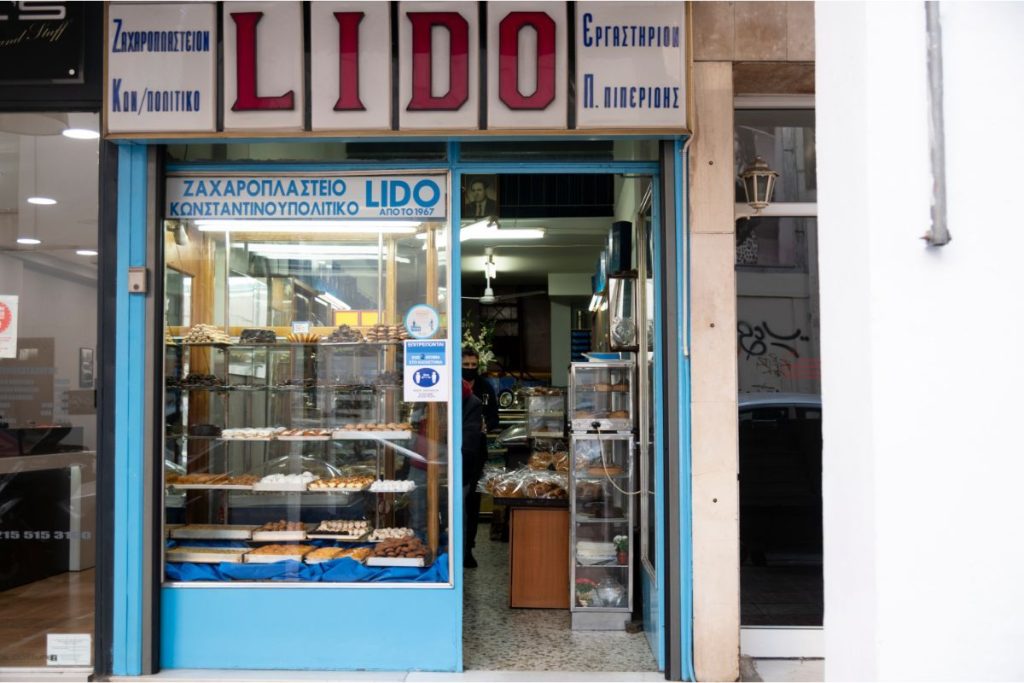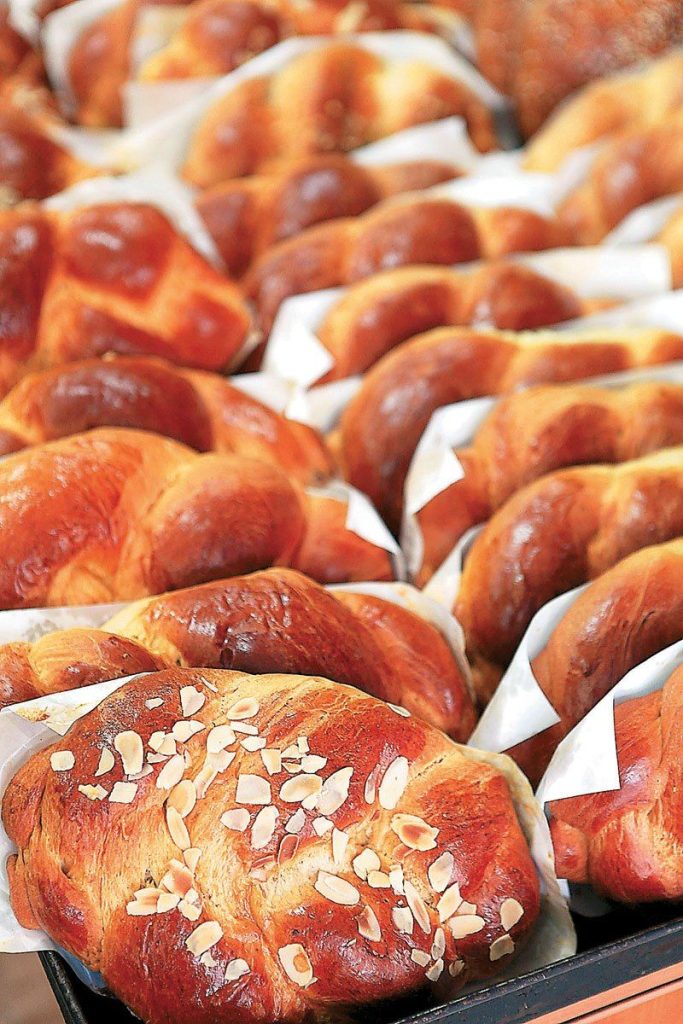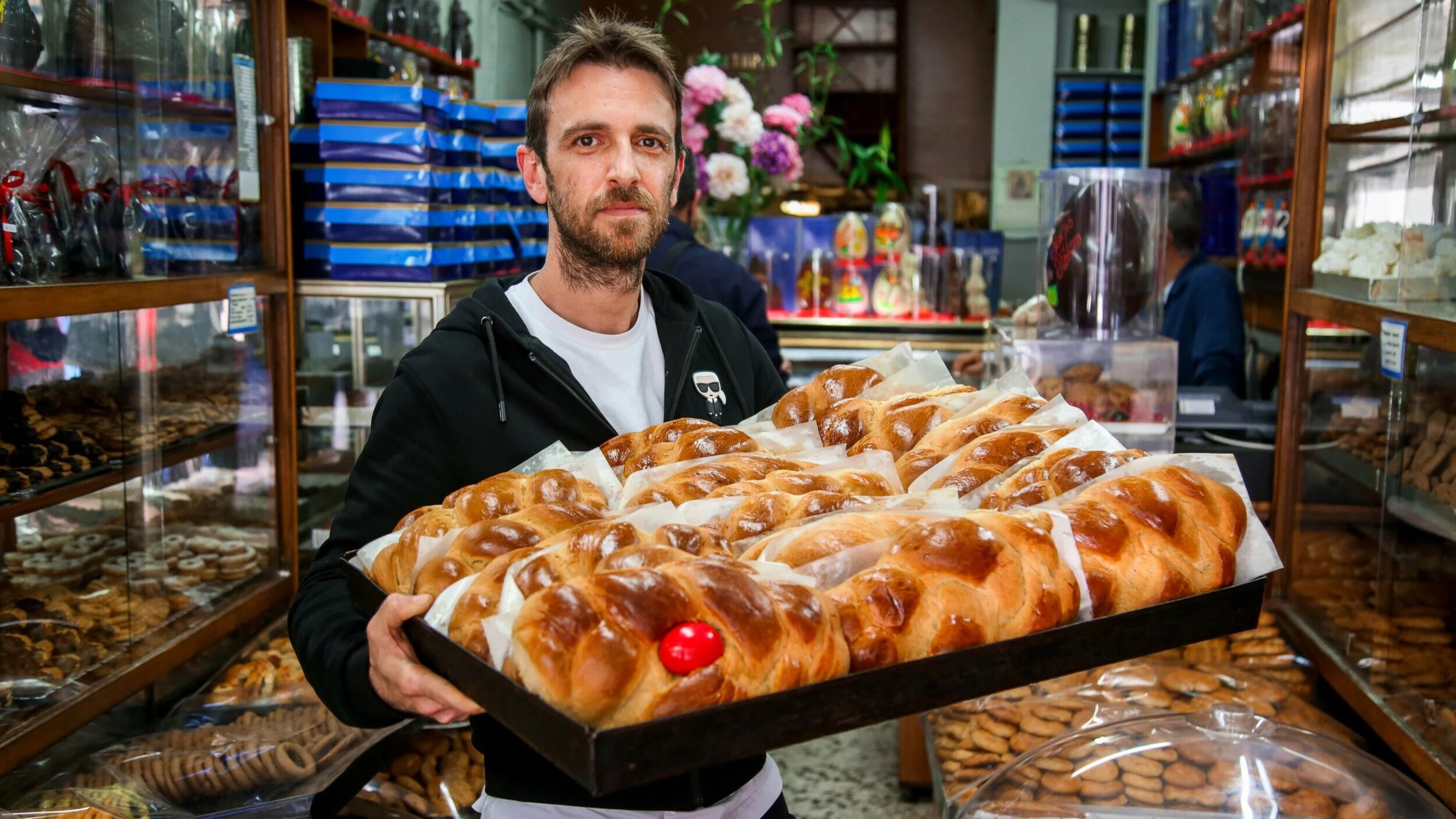By Ilias Karagiannis.
Bustling Pagrati, the hipster neighbourhood of Athens, empties every Easter except for one point. In Chremonidou Street, the queues start in the morning and continue uninterrupted until late afternoon.
The remaining residents of Pagrati and Athens wait a while to get one or more of the famous tsourekia of the traditional pastry shop, Lido.
The wider area is fragrant with mastiha, mahlepi and butter invading the nose of passers-by and occupying every inch of your mind. When you taste the tsoureki, the mastiha texture is written forever in your memory and you look for it ardently, as a return to the years you remember from your childhood.
This tsoureki could not be missed from the pages of The Greek Herald. I rushed to make an on-the-spot report, to smell the tsoureki of Lido, to taste all the flavours in order to convey its impressions.
Today, the traditional patisserie that Petros Piperidis opened in 1967 has passed into the hands of his namesake grandson.
Lido which is more than a business. It is the custodian of a taste which many of our readers before emigrating to Australia had tasted. It is the cohesive web of the past with the present.

“The recipe remains the same, it has not changed. It is the one my grandfather brought from the city [of Constantinople],” Petros tells The Greek Herald.
“What has changed is some suppliers. For example, the company that supplied the flour no longer exists. So we changed some suppliers. Although, for example, mahlepi we still buy from a certain area in Turkey.”
The tsoureki of Lido has taken on legendary proportions. The paper rolled up is now recognisable from afar. The classic blue with gold details can whet your appetite as soon as you see it, while when you open it you catch in your hands a fluffy brioche. Not overly sweet with ideal baking.

The story of Lido:
Petros’ grandfather first came to Greece from Constantinople. There he worked in pastry shops and as it turned out, he learned well everything about the recipes of success.
“My grandfather after he came from Constantinople decided to open the shop,” his grandson recalls.
“From the first months it became known and we are talking about times when it was much more difficult to make something known, since there was no social media. In those days, for something to be known it had to be spread by word-of-mouth and it had to be deserved.”
And indeed Lido began to build an underground reputation that swept all of Athens over the years. It became synonymous with tsoureki and continues to this day the quality of the dessert that constitutes the taste of Greek Easter.
Petros has memories of the pastry shop since he worked in it while growing up. He thought he would continue the pastry shop even though he wanted to study economics in England.
“I always had it in the back of my mind that I would get involved with the business. I even studied a subject which I knew would help me in this business: Economics. I continued my studies, I did my master’s degree in a related subject, which was the quality of production. When I finished my studies and military service, I decided to go back to the shop where I worked in my spare time,” Petros says.
Today, there are customers who have loved the store throughout the 56 years it operates.
“A lot of our customers come from the first day of the pastry shop, which my grandfather opened in 1967,” Petros explains.
“Some came as young men and today they come with their grandchildren. There are customers who buy tsourekia to send to their children in Paris. There is a timeless relationship with many of our customers that continues and will continue.”
The secrets of tsoureki
These days everyone more or less at home will attempt to make a tsoureki. The only difference is that a good tsoureki is science, as the expert tells us.
“Tsoureki is not the easiest thing, you don’t throw everything in a cauldron and it comes out. It is one of the most difficult recipes. It’s not like a cake. The tsoureki has too many stages. You have to let the dough rest and wait. Its kneading is difficult, too. You have to have a lot of patience to get a good result and that often leads to it not being the best,” Petros says.
Lido today offers not only its classic plain tsoureki, but also with flavours like chestnut and chocolate. There are also the newest creations, with chocolate inside and out or with white chocolate outside and chestnut inside. It’s a sign of a perpetual quest to offer old and new customers the best.

Kneading and baking is done in their workshop and customers who queue each time will get a hot tsoureki that has just come out of the oven.
That is why, although they have proposals to expand the business, they do not.
“If we had opened other shops they would have been like petrol stations and they would not have the hot tsoureki they buy today,” Petros explains about the refusal to expand.
Today, the biggest challenge for the Lido continues to be the accuracy it has swept across the planet.
“We are trying to keep prices down. Because costs have increased. That’s the biggest challenge. The prices of raw materials can change every week,” Petros says.
What certainly does not change is the taste of the legendary tsoureki of Lido.

